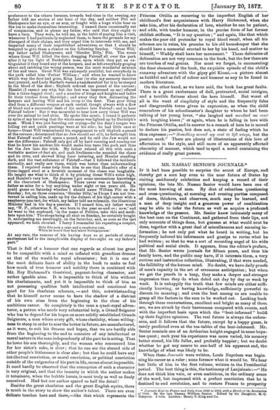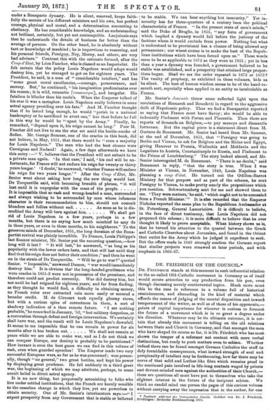MR. NASSAU SENIOR'S JOURNALS.*
Jr it had been possible to surprise the secret of Europe, and thereby get a sure key even to the near future of States by visiting assiduously celebrities and keeping a record of their opinions, the late Mr. Nassau Senior would have been one of the most knowing of men. By dint of relentless questioning and cross-questioning, at morning and evening parties composed of doers, thinkers, and observers, much may be learned, and a man of deep insight and a generous power of combination may be able to infer the future as well as acquire a profound. knowledge of the present. Mr. Senior knew intimately many of the best men on the Continent, and gathered from their lips, not only accounts of things done, but guesses at what would next be done, together with a great deal of miscellaneous and amusing in, formation ; he not only put what he heard in writing, but he- frequently induced his informants and gossips to revise what he-
had written ; so that he was a sort of recording angel of his wide- political and social circle. It appears, from the editor's preface., that Mr. Senior wrote journals for fifteen years, and thus his family have, and the public may have, if it interests them, a very curious and instructive collection, illustrating, if that were needed, the fallibility of the human mind. No doubt, we have daily proofs of man's capacity in the art of erroneous anticipation ; but when we get the proofs in a heap, they make a deeper and stronger- impression than they do when doled out day by day or week by week. It is unhappily the truth that few minds are either suffi- ciently knowing, or having knowledge, sufficiently powerful to. discern its meaning ; and even the best among us are unable to. grasp all the factors in the sum to be worked out. Looking back through these conversations, excellent and bright as many of them. are, we are struck by their barrenness compared with events, and with the imperfect basis upon which the " best-informed " build. up their fugitive opinions. The real future is always the unfore- seen, and it follows that the future, except by a happy guess, is- rarely predicted even at the tea-tables of the best-informed. Mr... Senior reminds one of an Arthurian knight engaged in some hope- less quest ; each year his experience was more varied, his memory better stored, his life fuller, and probably happier ; but we doubt whether he got any nearer to one-half of his apparent end, the knowledge of what was likely to be.
When these Journals were written, Louie Napoleon was begin. fling his career as a ruler ; none foresaw what it would be. We hear but little of him in the first volume, written in the Presidential period. The best thing is this, the testimony of Lanjuinais :—" He does not think him vain, or even ambitious, in the ordinary sense of the word, but impressed with a perfect conviction that he is destined to end revolution, and to restore France to prosperity
• Journals Kept in France and Italy from 1848 to 1852, with a Sketch of the Revolution, of 1848. By the late Nassau William Senior. Edited by his Daughter, Simpson. 2 vole. London: Henry S. King and Co.
under a Bonaparte dynasty. He is silent, reserved, keeps faith- fully the secrets of his different ministers and his own, has perfect courage, physical and moral, and a determination amounting to obstinacy. He has considerable knowledge, and an understanding not brilliant, certainly, but yet not contemptible. Lanjuinais says that he understands the details of business far better than the average of persons. On the other hand, he is absolutely without tact or knowledge of mankind ; he is impervious to reasoning, and his personal friends, Persigny, Ney, Moray, and others, are very bad advisers." Contrast this with the estimate formed, after the Coup d'Etat, by Loon Faucher, who is classed as an Imperialist. He felt certain that the policy Louis Napoleon would adopt would destroy him, yet he managed to get on for eighteen years. The President, he said, is a man of "considerable intellect," and has "some great moral excellencies,—courage, perseverance, and secrecy. But," he continued, "his imagination predominates over his reason ; it is wild, romantic fromanesque], and irregular. His fatalism is blinder than his uncle's. When the Emperor talked of his star it was a metaphor. Louis Napoleon really believes in some astral agency presiding over his fate." And M. Faucher thought that if he lasted long enough, he would "perish in a national bankruptcy or be sacrificed to avert one," but that before he fell in this way he would be "upset by the Army." Finally, he remarked, "depend upon it, his reign cannot be long." Poor M. Faucher did not live to see the star set amid the battle-smoke of Sedan. Mr. George Sumner, one of the oracles in this book, did not believe, in May, 1851, that there would be "even a majority for Louis Napoleon." The men who had the best chance were Cavaignac and Nadaud! Again, a few days afterwards we have this entry :—" V. believes that the President will not submit to be a private man again. 'In that case,' I said, 'his end will be un- fortunate, for France will not endure his reign for twenty or thirty years longer." I doubt,' he answered, whether France will endure his reign for two years longer.'" After the Coup d 'Etat, Mr.
Senior went about asking how long the new thing would last De Tocqueville said, with becoming breadth of phrase, "it will last until it is unpopular with the mass of the people It is impossible that so rash and wrong-headed a man, surrounded and always wishing to be surrounded by men whose infamous character is their recommendation to him, should not commit blunders and follies without end. As soon as he is dis- credited the Army will turn against him We shall get
rid of Louis Napoleon in a few years, perhaps in a few months, but there is no saying how much mischief he may do in those years, or even in those months, to his neighbours." To the generous minds of December, 1851, the long duration of the Bona- partist revival was plainly incredible. To Damon, Louis Philippe's last finance minister, Mr. Senior put the recurring question,—how long will it last ? "It will last," he answered, "as long as his popularity with the lower orders lasts, and that will last until they find that his reign does not better their condition ;" and then he went on in the strain of De Tocqueville. "Will he go to war?" queried Senior. "impossible," answered Damon, "war would immediately destroy him." It is obvious the the long-headed gentlemen who were oracles in 1851-2 were not in possession of the premisses, and therefore could not predict correctly. War did destroy him, but not until he had reigned for eighteen years; and far from finding, as they thought he would find, a difficulty in obtaining money, no French ruler ever extracted coin more easily or secured a broader credit. M. de Circourt took equally gloomy views, but with a curious spice of correctness in them, a sort of shadowy indication of a then remote future. "I see nothing probable," he remarked in January, '52, "but military despotism, or a restoration through defeat and foreign intervention. We certainly shall have war, and the result will be Louis Napoleon's downfall. It seems to me impossible that he can remain in power for six
months after it has broken out We shall not remain at peace while we are able to make war, and as I do not think we can conquer Europe, our destiny is probably to be partitioned." How inexact is even the best guess we can find in this volume of rash, even when guarded speeches ! The Emperor made two very successful European wars, so far as he was concerned ; won person- ally, though "no general," two great battles, and kept his power by displaying great prudence. He fell suddenly in a third great war, the beginning of which we may attribute, perhaps, to some occult belief in direct astral agency.
It is no new thing, but perpetually astonishing to folks who live under settled institutions, that the French are keenly sensible to the ceaseless change in which they live, yet are powerless to obtain security. One of Mr. Senior's interlocutors says :—" I expect prosperity from any Government that is stable or believed to be stable. We can bear anything but insecurity." Yet in- security has for three-quarters of a century been the political characteristic of France. "In the present state of men's minds," said the Duke of Broglie, in 1851, "any form of government which implied a dynasty would fall before the jealousy of the factions whom it would exclude from power. Nothing but what is understood to be provisional has a chance of being allowed any permanence ; our wisest course is to make the best of the Repub- lican institutions which have been forced upon us." These words seem to be as applicable to 1872 as they were to 1851; yet in less than a year a dynasty was founded, a government believed to be stable was established, and a prosperity that attained large propor- tions began. Shall we see the order repeated in 1872 or 1873? The vanity of prophecy, as exhibited in these volumes, bids us be silent. The best of human wisdom seems to be of the hand-to- mouth sort, especially when applied to an entity so incalculable as France.
Mr. Senior's Journals throw some reflected light upon the revelations of Bismarck and Benedetti in regard to the aggressive drift of Napoleonic policy. Thus we find a Bonapartist reported as saying that France must have Savoy; she would be able to indemnify Piedmont with Parma and Placentia. Then there are reports of demands on Belgium,—to pay moneys and dismantle fortresses. But the capital piece is a statement direct from M. Gustave de Beaumont. Mr. Senior had heard from Mr. Sumner, at the end of December, 1851, that "Persigny was going to Berlin and Vienna, to ask for Belgium and the Rhine and Egypt, giving Hanover to Prussia, Wallachia and Moldavia and the Legations to Austria, Constantinople to Russia, and Piedmont to the Prince of Leuchtenberg." The story looked absurd, and Mr. Senior interrogated M. de Beaumont. "There is no doubt," said Beaumont in reply, "that the story is true. When I was Minister at Vienna, in November, 1849, Louis Napoleon was planning a coup d'etat. He turned out the Odillon-Barrot Ministry for that impose and as part of the scheme, he sent Persigny to Vienna, to make pretty nearly the propositions which you mention. Schwartzenberg sent for me and showed them to me. They were matters,' he said, 'which ought not to be concealed from a French Minister." It is deo recorded that the Emperor Nicholas reported the same plan to the Republican Ambassador at St. Petersburg, General Lamoriciere. It is difficult to belieire, in the face of direct testimony, that Louis Napoleon did no propound this scheme ; it is more difficult to believe that he ever thought it likely to prove acceptable. What history shows us is that he turned his attention to the quarrel between the Greek and Catholic Churches about Jerusalem, and found in the Orient that outlet for the Army which he judged it expedient to seek. But the offers made in 1849 strongly confirm the German report that similar projects were renewed at later periods, and with emphasis in 1866-67.



































 Previous page
Previous page